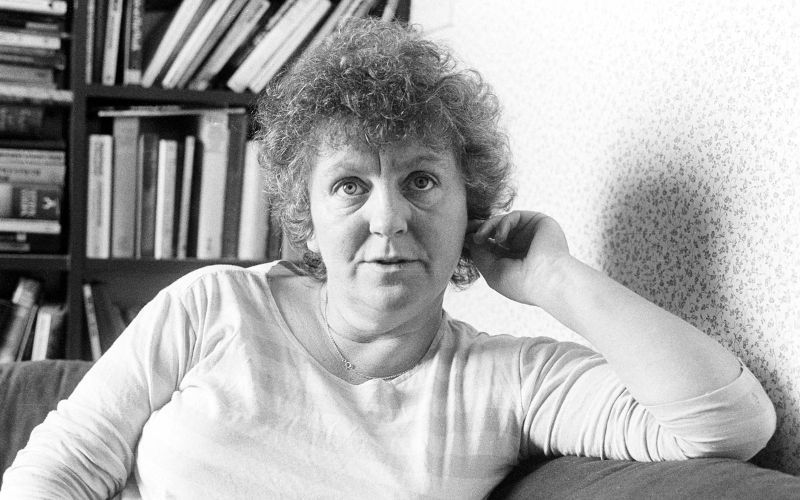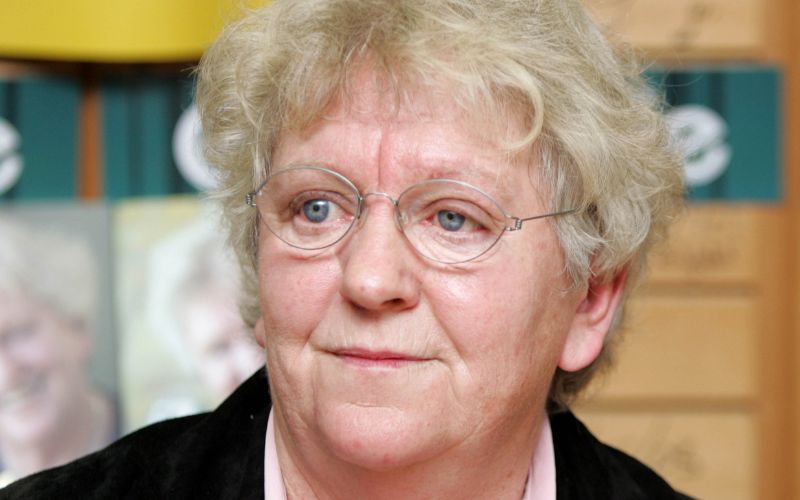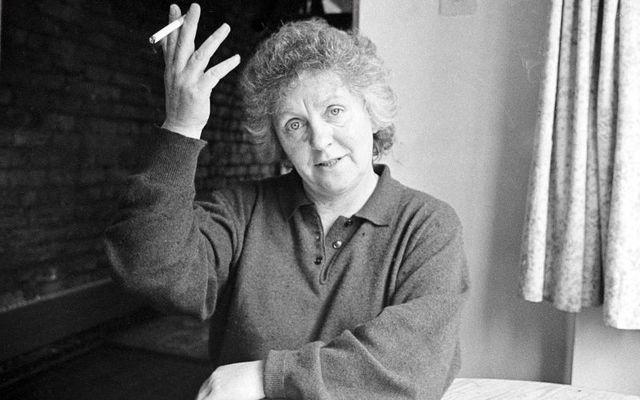"Goodnight, sisters" – and the wink.
That is how a generation will remember Nell McCafferty. It was her sign-off on "The Women’s Programme," a television series hosted by her good friend Marian Finucane, that aired from 1983 to 1986.
It was widely derided by a certain cohort of men and many conservative women, who believed that trailblazing feminists such as Marian and Nell had ideas above their station, and the issues they discussed had no place on RTÉ.
The wink sent a clear and conspiratorial message. The revolution was underway – and nothing would stop it.
It was vintage Nell.
Her sense of humour was mischievous to the point of impish but, just as is the case with those fairytale creatures, it was a feint, one that lulled you into a false sense of security before a sucker punch was delivered with a slightly more malevolent smirk.
She never was one to suffer fools gladly, and even her friends and casual acquaintances knew there had to be a solid basis for an argument, because a weak one would be demolished in less time than it took her to finish a cigarette.
Nell was born in the Bogside, in Derry, in March 1944, and by the time she reached adulthood, that city was the cauldron of the Civil Rights movement in Northern Ireland, artificially sundered by partition from its natural hinterland of Co Donegal.
She was a contemporary of the many young Turks of the nationalist movement, among them John Hume, Eamonn McCann, and Martin McGuinness.
She also had come to the realisation she was gay, but kept it from her parents Hugh and Lily for fear of their reaction. At Thornhill College, a grammar school for girls, she fell in love for the first time. In 1960, she confessed her sexuality to a priest, who told her to turn away from "sin." Rebellious as ever, Nell instead just turned away from the Church.
Two nuns were more understanding, Nell later told blogger Berit Haugen Keyes.
"I was blessed by them," she said. "Two nuns who listened to me, showed me compassion, made it possible for me to go on when I was discovering what it meant to be gay."

Nell McCafferty in 1984. (RollingNews.ie)
She excelled at school, and secured a free place to complete an arts degree in Queen’s University in Belfast. After teaching for a while, she spent time on a kibbutz in Israel, before becoming a journalist with the Irish Times.
Her dispatches from the Dublin District Court, In The Eyes Of The Law, were groundbreaking, fleshing out the stories of the dis -advantaged who found themselves before judges for misdemeanours often occasioned by poverty, or early exit from full-time education, or general societal disadvantage.
For many readers, these stories were eye-opening, adding a hitherto uncommunicated layer of pathos to the presentation of the tales of beggars, alcoholics, and victims of domestic abuse.
In May 1971, she and a group of 49 fellow activists in the Irish Women’s Liberation Movement returned from Belfast on what became known as the Contraceptive Train. Contraception had been illegal in the Free State, later the Republic, since 1935, leaving many in poverty because they had no ability to restrict the size of their families.
Followed by international film crews, the women arrived back in Dublin’s Connolly Station bran dishing condoms and spermicidal jelly, and waving packets of the contraceptive pill. In fact, these were aspirin, but, as they correctly reasoned, no one in Ireland knew what the actual Pill looked like anyway.
Meet the woman who smuggled birth control into 1970s Ireland on a ‘contraceptive train’ https://t.co/hlh0TxRSGT pic.twitter.com/PVAXrAeAp6
— BBC News (World) (@BBCWorld) March 9, 2023
The protest opened up the debate, though it would be another decade before the sale of condoms was legalised. It also put Nell in the national spotlight, and gave her the moral authority to write critically on the cases of 15 -year-old Ann Lovett, who died after giving birth in a church grotto in Co Longford, and Joanne Hayes, wrongly charged with murder in what became known as the Kerry Babies case.
Nell’s book on the latter subject, "A Woman To Blame," was a searing indictment of the mostly male forces of the State, gardaí, the judiciary, and politicians alike, who engaged in a patriarchal witch-hunt. Nell lived long enough to see the State formally apologise, in 2020, for the "appalling hurt and distress caused" to Ms. Hayes.
Joanne Hayes, the woman wrongly accused of murdering a baby over 35 years ago, and her siblings have received an apology from the Garda Commissioner and the Minister for Justice. | Read more: https://t.co/uqgHs08Xbd pic.twitter.com/ot8msE4Flx
— RTÉ News (@rtenews) December 18, 2020
Her life was not without self-generated controversies. On television in 1987, she was asked by Conor Cruise O’Brien – who as minister for posts and telegraphs had strengthened the 1960 Section 31 ban on interviews with members of the "old" IRA and the Provisional IRA – if she supported the IRA. She said she did – the day before 11 people were murdered by an IRA bomb on Remembrance Sunday in Enniskillen.
Nell was banned from appearing on RTÉ for three years, but returned in triumph on the radio as a roving reporter during the Italia ’90 World Cup. By this stage, her professional and private lives had seen great change. After a sabbatical to write a never-published novel in the early 1980s, the Irish Times decided not to have her back, and she became a staff member in the Sunday Tribune from the late 80s until 2003.

Nell McCafferty. (RollingNews.ie)
Though she still had not told her family she was a lesbian, Nell lived openly in a romantic relationship in a house in Ranelagh with Nuala O’Faolain for 15 years, before O’Faolain ended it in 1994. The pain of the break up pierced Nell, not least because O’Faolain, in her memoir, cruelly said she "never thought of Nell as a woman" and 'would still walk across 59 women to get to one man."
On leaving the Tribune, Nell went freelance, writing occasionally for the Irish Daily Mail, among others. Her activism continued too. During the debate on the proposed Twenty-Fifth Amendment to the Constitution that sought to remove the threat of suicide as grounds for a legal abortion, at a press conference, Nell forced the masters of the three national maternity hospitals to agree that if the referendum passed, they would not be able to provide optimum medical care to women carrying babies with fatal foetal abnormalities. By the narrowest of margins, the referendum was defeated.
Nell again was active in the campaign to repeal the Eighth Amendment in 2018, when a two -thirds majority, in a clear display of how much Ireland had changed in her lifetime, voted to legalise abortion. Her death on Wednesday in a Donegal nursing home, at 80, has led to a damburst of tributes and many of them have been as honest as Nell herself. Yes, she could be maddening, and spiky, and blunt, but when you look back at her life, she had lots to be maddening, spiky, and blunt about.
But, if you were in her company, and you got the smile, and even better if you got the wink, there was something magical about her. Nationalist. Feminist. Pioneer. Fighter. Disruptor.
And imp. Always an imp.
*This article was originally published on Extra.ie.




Comments